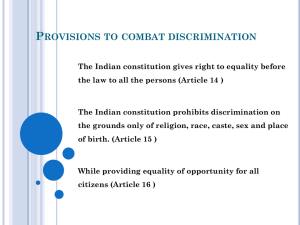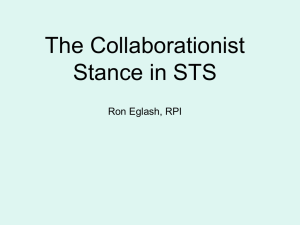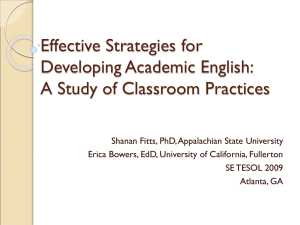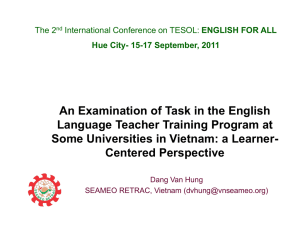Demand High ELT Blank session handout
advertisement
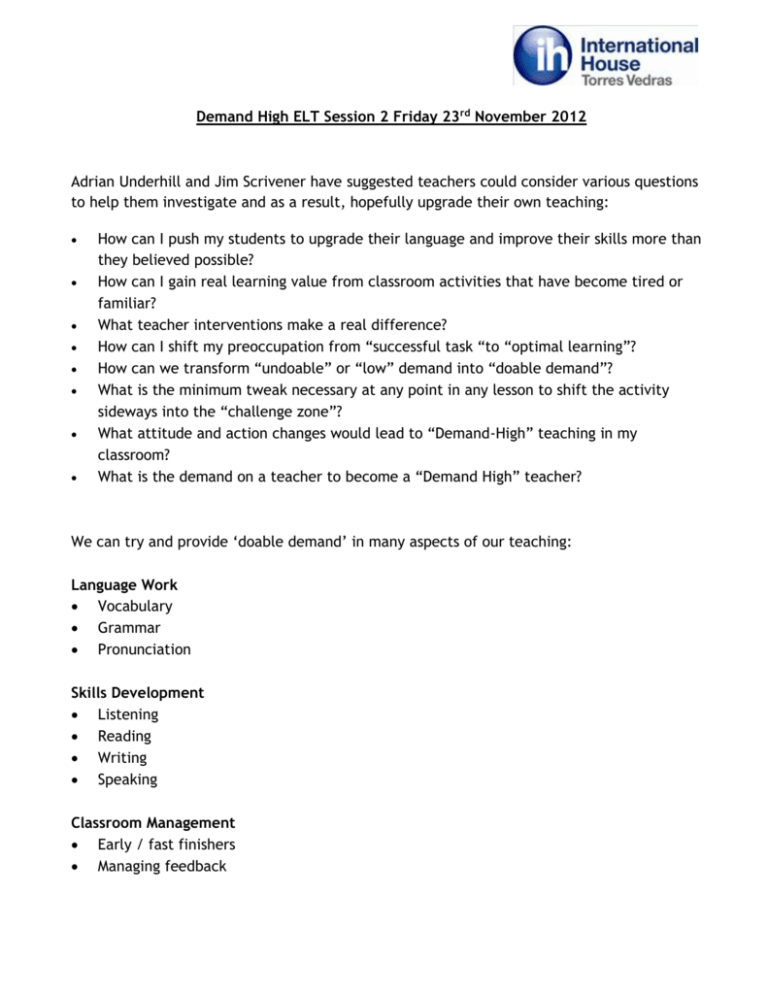
Demand High ELT Session 2 Friday 23rd November 2012 Adrian Underhill and Jim Scrivener have suggested teachers could consider various questions to help them investigate and as a result, hopefully upgrade their own teaching: How can I push my students to upgrade their language and improve their skills more than they believed possible? How can I gain real learning value from classroom activities that have become tired or familiar? What teacher interventions make a real difference? How can I shift my preoccupation from “successful task “to “optimal learning”? How can we transform “undoable” or “low” demand into “doable demand”? What is the minimum tweak necessary at any point in any lesson to shift the activity sideways into the “challenge zone”? What attitude and action changes would lead to “Demand-High” teaching in my classroom? What is the demand on a teacher to become a “Demand High” teacher? We can try and provide ‘doable demand’ in many aspects of our teaching: Language Work Vocabulary Grammar Pronunciation Skills Development Listening Reading Writing Speaking Classroom Management Early / fast finishers Managing feedback Demand High ELT Session 2 Friday 23rd November 2012 Examples of activities that are not How to make these questions and Examples of activities that are too challenging enough / don’t activities into more ‘doable challenging / difficult and why stretch the sts and why demands’ Vocabulary A. Teacher to sts: What does ‘a range’ mean? Not necessarily sufficiently contextualized; Sts may well not have the language to explain, even though they understand. Net result could be that teacher is faced with silence, so wastes time explaining again. B. Teacher to sts: Write a job for every letter of the alphabet. The group with the most is the winner. C. Teacher to sts: read and repeat these words Very little demand on sts. They may not be sufficiently engaged with the task to learn anything from it. A. Provide a context, or refer sts back to the context from which the word came. Elicit or give examples, or synonyms (and if nec clarify difference between the two words). Get sts to put the new word in a sentence to demonstrate they understand meaning, form and context(s). D. Teacher to sts: Read and match these words to the pictures Other ideas for making Vocabulary work more challenging Sts compare various pairs of words and decide on various similarities / differences. Sts reflect on words covered in the lesson eg: which ones do they like/not like/are ‘easy’ or ‘difficult’/might be useful/are already familiar to them and why. In presentation, teacher tells sts ‘I bet you know at least six of these words’ / ‘I bet you find 5 of these words hard to pronounce.’ Listening A. Listen to the conversation and take notes B. Teacher conducts open-class feedback of sts’ answers immediately after listening to the text C. Sts and read and listen to the text at the same time. D. Teacher plays the text twice because that’s what s/he was trained to do Other ideas for making Listening work more challenging Examples of activities that are not How to make these questions and Examples of activities that are too challenging enough / don’t activities into more ‘doable challenging / difficult and why stretch the sts and why demands’ Reading A. Teacher doesn’t generate interest in the text or activate sts’ schemata C. Teacher gets sts to say what the text is about generally, and then takes specific examples of a structure from the text as a basis for language analysis B. Teacher gives sts a list of questions that unwittingly test a mixture of different types of reading subskills eg: gist, scanning, inference, opinion, deducing meaning of vocabulary Other ideas for making Reading work more challenging Writing A. Teacher hands out a writing task at the end of the lessons for sts to complete at home C. The model text the sts work from is too similar to one they will produce – they won’t need to make many changes. B. Teacher gets sts to use a model text as a basis for them writing their own, but doesn’t highlight textual elements eg: text organisation and layout, language features that they should use. Other ideas for making Writing work more challenging Examples of activities that are not How to make these questions and Examples of activities that are too challenging enough / don’t activities into more ‘doable challenging / difficult and why stretch the sts and why demands’ Speaking A. Teacher gives sts some questions to discuss in pairs. B. In an information gap activity (pairwork or mingling), the complete questions that sts are required to work from are on the tasksheet. C. Teacher provides choral drilling, working from complete sentences written on the board. Other ideas for making Speaking work more challenging Pronunciation A. Teacher ‘corrects’ every pronunciation mistake a st makes, but doesn’t show sts the difference between what they are saying and a more intelligible version, not how to aim for that. B. Teacher uses a minimal pair activity from the coursebook that is not relevant eg: for Portuguese sts /b/ and /v/ or /l/ and /r/. Other ideas for making Pronunciation work more challenging Examples of activities that are not How to make these questions and Examples of activities that are too challenging enough / don’t activities into more ‘doable challenging / difficult and why stretch the sts and why demands’ Early / Fast finishers A. Teacher gives them a reading text to look at. B. Sts wait until everyone else has finished the task. Other ideas for keeping early / fast finishers more challenged Grammar A. Teacher does not integrate form, meaning and pronunciation in the presentation phase. D. Teacher gives explanations rather than asks concept questions – either verbally or by getting sts to read through grammar table in coursebook. B. Teacher asks insufficient or no concept questions. E. In a test, sts are not required to produce language for themselves (eg cloze test), but to complete gaps choosing from a limited number of given words. C. Teacher doesn’t anticipate potential problems with the language when planning the lesson, and/or doesn’t consider what assumptions can be made regarding what sts already know/can do with the target language. Other ideas for making Grammar work more challenging Examples of activities that are not How to make these questions and Examples of activities that are too challenging enough / don’t activities into more ‘doable challenging / difficult and why stretch the sts and why demands’ Managing feedback A. Teacher asks shyer / weaker sts for their answers first; B. Teacher doesn’t allow sts time to prepare for feedback or ‘decode/recode’ what they’ve understood from a text. C. Teacher goes through all the answers to an exercise and gets the right answer to one question from one st, then moves on to the next question and so on. D. Teacher doesn’t nominate – questions are not directed to any particular st. Other ideas for making feedback more challenging

